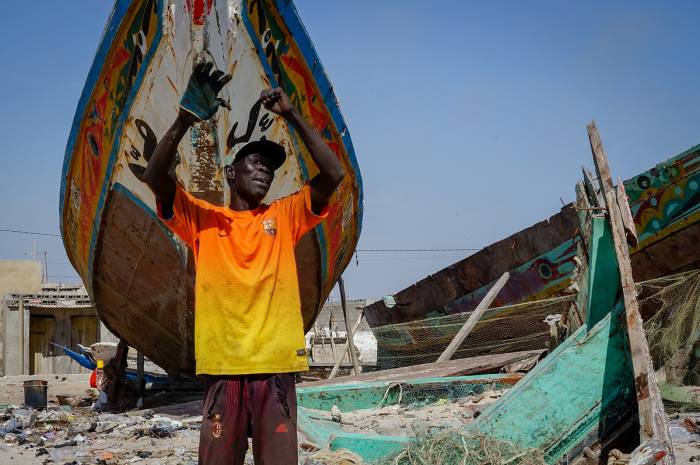The window to stay below 1.5°C of warming is closing fast. People’s lives are at stake – we must get to zero fossil fuels as fast as possible. This story is from the People’s Dossier on 1.5°C here.
The sleepy town of Bargny, Senegal, is one of the country’s most vulnerable to coastal erosion. Located about 15 km to the east of the capital, Dakar, continued rising waters have destroyed hundreds of houses in fishermen communities. Sea rising has become a major threat that grows by more than two meters a year, forcing hundreds of people to pile up in riparian neighborhoods. Bargny is now also threatened by the construction of Senegal’s first coal power plant in the nearby village of Sendou. Already victims of the pollution provoked by the Sococim, a cement plant at 1.5 km distance, and of the coastal erosion due to climate change, citizens are concerned by the potential impact that the new power plant will have on their health and the environment.
Like the hundreds of coal plants planned or already under construction worldwide, the Sendou coal plant will only add to the climate crisis that is threatening the people of Bargny. If the world will warm more than 1.5 Celsius degrees above pre-industrial levels, the fight against rising sea levels will be lost.
Since 2014, community members have been organising and mobilising in Bargny and surrounding villages to challenge and oppose the construction of the coal plant. They held a mass demonstration at the same time of COP21 in Paris and organized marches and awareness raising events, calling on President Macky Sall to take a stand against coal power plants, and to invest instead in renewable energies.

Photo: Waterkeeper Alliance
“They want to get it up and running this month, but we’re gonna do everything we can to stop it.” said Fadel Wade, a local activist.
The construction of the plant, however, goes on, and some farmers reported bulldozers entering their fields to clear the land to make way for the construction of a coal terminal on the endangered coast..
“Polluting industries are established throughout the area. We’re caught in a pincer!” added Wade.
The site of the plant lies a few hundred meters from a fish-processing site that employs 1,000 women from the village, a daycare and health center, and a primary school. It is half a kilometer away from the houses recently rebuilt after the latest storm surge.
Ocean systems and coastal areas are particularly vulnerable to climate change. The entire economy of coastal Bargny is based on the marine life that is threatened by a warming climate.
The long-term benefits of limiting warming to 1.5°C, as enshrined in the Paris Agreement, largely outweigh the short-term costs in terms of increased economic growth, employment, avoided climate impacts, energy security, access and imports and health. However, fossil fuel energy expansion is portrayed by the Senegalese government and elites as necessary to achieve development of the country.
The resistance to fossil fuel infrastructure by the people of Bargny offers an alternative path to development for Senegal and Western Africa, one that can spare the next generation from inheriting the behemoth infrastructure of outdated and destructive technologies, and instead open a new chapter through a continent-wide adoption of small scale, decentralized renewable energy to satisfy the energy needs of families and small businesses throughout the continent.